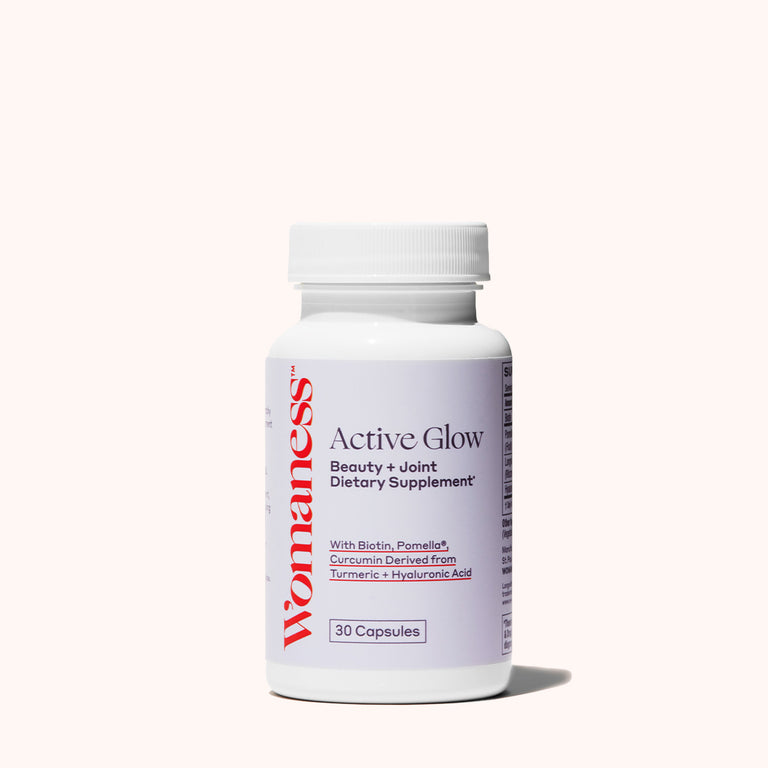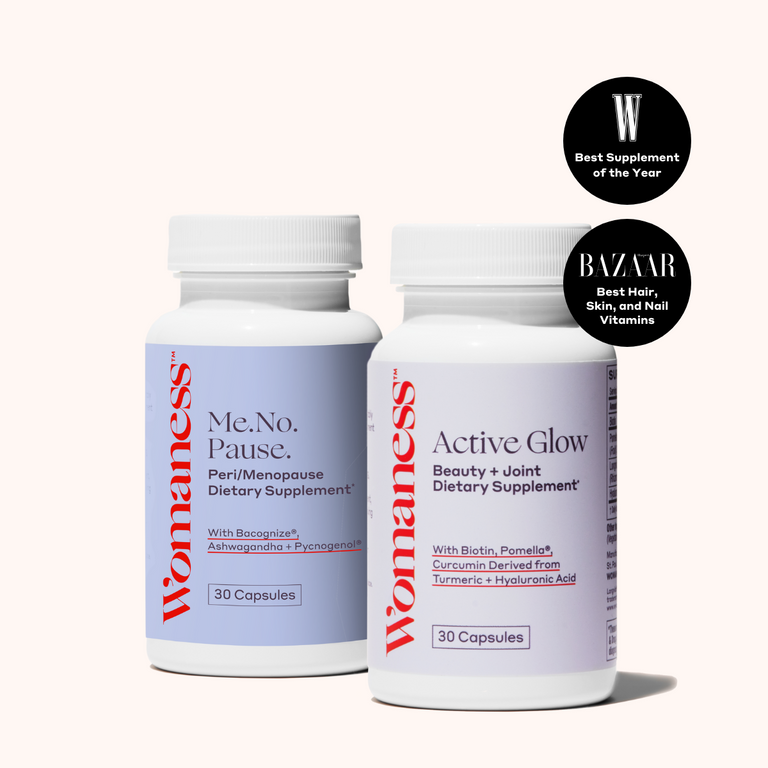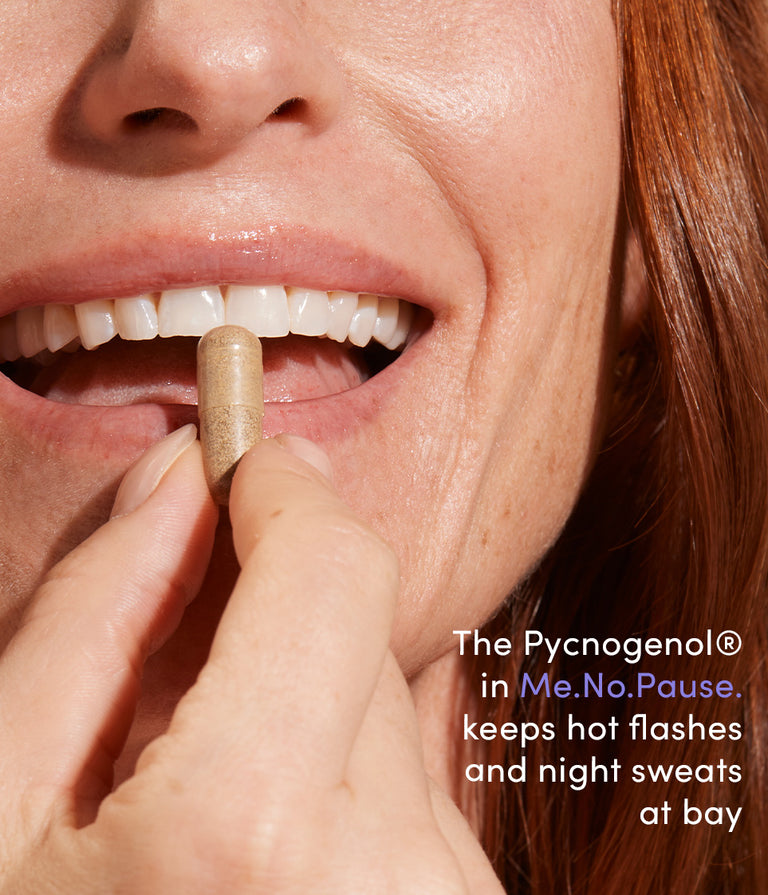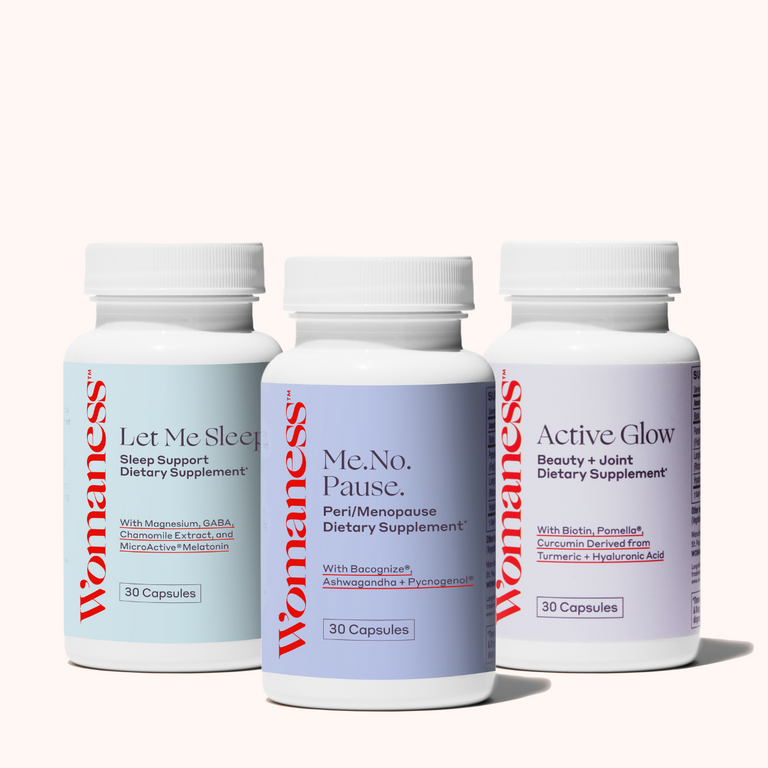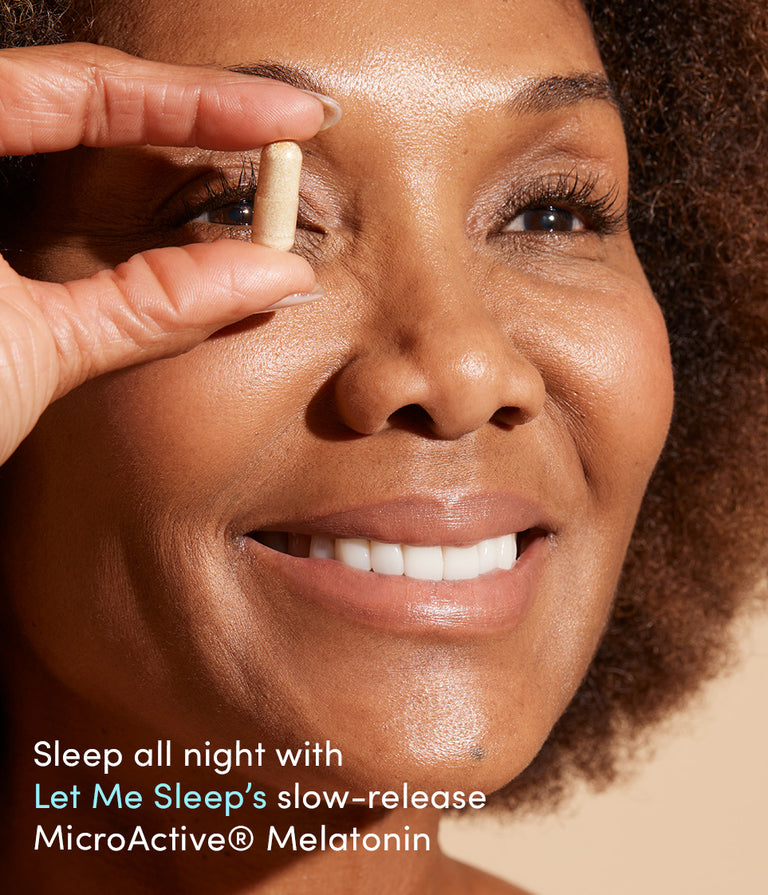By Allie Lansman, RDN, LD 5-Minute Read
 Allie Lansman, RDN, LD is a freelance nutrition and sustainability writer, educator, and consultant. As a dietitian, she is passionate about equipping current and former menstruators to make empowering nutrition choices throughout their lives through inclusive articles—with an eco-consciousness flair!
Allie Lansman, RDN, LD is a freelance nutrition and sustainability writer, educator, and consultant. As a dietitian, she is passionate about equipping current and former menstruators to make empowering nutrition choices throughout their lives through inclusive articles—with an eco-consciousness flair!
Experiencing a lack of vibrancy, strength, or luster in your skin, hair, or nails? You're not alone. A decline in hair, skin, and nail health is a common symptom of menopause.
While you should seek advice from a trusted medical professional if you’re experiencing any of these issues, your diet is more influential than you think. Various nutrients can pull triple duty in terms of improving hair, skin, and nail health in menopause.
It’s All About Protein (and Hormones!)
Your hair, skin, and nails are all connective tissues that, while unique in function, are all made up of protein—specifically, collagen and keratin.
Collagen is the most abundant protein in the human body, making up 30% of the body’s total protein. It provides structure to connective tissues like hair, skin, and nails, but also muscles and bones. Keratin is also a body protein found in large amounts. It is found in the skin but in significant amounts in the hair and nails, providing strength and thickness.
Production of collagen is also strongly influenced by hormone levels—specifically estrogen—in the body. As estrogen levels fall during menopause, collagen also produced decreases, and connective tissue structure begins to break down. Keratin production depends on amino acids—the “building blocks” of larger proteins—derived from collagen. As a result, both proteins decrease in the body, and your hair, skin, and nails can lose strength and elasticity to show signs of aging.
"A nutrient-dense diet has been found to support the gentle aging process and improve the tissue structure of the skin, hair, and nail systems."
How Less Collagen Can Impact Hair, Skin, and Nails
There are a variety of hair, skin, and nail symptoms you can experience during menopause. And, as with any change in health, all people have their unique collection of declining collagen manifestations.
For hair, there are several hormones at play than just estrogen. The accompanying drop in progesterone during menopause also negatively affects hair growth and fullness. An increase in androgen is also stimulated as estrogen and progesterone decrease, shrinking hair follicles while potentially contributing to hair growth on the face. Signs of menopause-related hair issues include:
-
Lack of luster
-
Slower growth
-
Strand thinness
-
Hair breakage, fall, loss
-
Development of "peach fuzz" on the face
It is estimated that in the first five years of menopause, 30% of the collagen in the skin is lost. As a result, common signs of collagen degradation in the skin are an increase in:
-
Sagging
-
Wrinkles
-
Dryness
-
Discoloration (i.e., dark spots)
Your nails are highly dependent on keratin, which forms the many layers of tissue that compose the nails. However, as keratin decreases, these layers become thinner and can lead to weakness and signs that include:
-
Dryness
-
Brittleness
-
Splitting and cracking
What You Eat Can Help!
While medical therapies should be discussed with your physician if you’re experiencing any of the above symptoms, what you eat can potentially make a difference in your skin, hair, and nail health.
A nutrient-dense diet has been found to support the gentle aging process and improve the tissue structure of the skin, hair, and nail systems through various avenues. Including leveling hormones in the body, boosting collagen and keratin production, and fending away damage caused by oxidative stress.
7 Nutrients to Maintain Healthy Hair, Skin, & Nails in Menopause
You can get a lot of “bang for your buck” (pardon the pun) regarding nutrients that support skin, hair, and nail health and menopause maintenance. Typically, nutrients that support one tissue system also support the other, making addressing these symptoms very easy!
These 7 nutrients—and the foods you can find them in—can support you in improving the quality of your hair, skin, and nails in menopause:
1. High-quality protein
Because protein is so essential to the structures of collagen and keratin, you likely knew it would be on this list!
For the body to produce both of these proteins, essential amino acids are needed, which can only be accessed from your diet. And because menopause decreases the body’s ability to synthesize collagen and keratin, increasing your daily intake can improve your ability to produce these proteins. High-quality sources of protein—containing all essential amino acids and low in saturated fat—include:
-
Seafood
-
Poultry
-
Soybeans and soy-derived foods
-
Spirulina
2. Omega-3 fatty acids
Omega-3 fatty acids are a jack-of-all-trades nutrient. Not only can they support the structure of and nourish hair, skin, and nails, but they also decrease inflammation in the body and regulate hormone levels.
Make sure your diet has an adequate amount of this unsaturated fat with these foods:
-
Seaweed and algae
-
Nuts and seeds
-
Plant-based oils
-
Fatty fish (i.e., salmon or sardines)
3. Vitamin C
Vitamin C provides a host of benefits, not only for protein levels in the body but also for menopause management. This vitamin is a vital ingredient for the production of collagen and serves as an antioxidant. The antioxidant properties of vitamin C are one of the most beneficial for reducing oxidative stress damage associated with menopause. Foods containing ample vitamin C are:
-
Citrus fruits
-
Strawberries
-
Bell peppers
-
Cruciferous vegetables
-
White potatoes
4. Zinc
The mineral zinc is involved in the body’s protein synthesis process. Not only are collagen and keratin proteins, but hormones—like estrogen and progesterone—are also proteins. Having ample amounts of this mineral in your diet can help balance your internal protein and hormone levels during menopause. Try adding one of these zinc-dense foods to your next meal or snack:
-
Oysters and other shellfish
-
Sweet potato
-
Chickpeas
-
Eggs
5. Vitamin A
Vitamin A is a wonder nutrient for improving hair, skin, and nail health, promoting strength and luster, and protecting as an antioxidant. This vitamin supports cell production and regeneration and the natural moisturizing of tissues to reduce the brittleness of hair and nails and skin dryness. Though vitamin A is popular in topical applications as a form of retinoid, you can also find it in colorful foods, especially those that are yellow, orange, or red, including:
-
Pumpkin and other squash
-
Cantaloupe
-
Mango
-
Tomatoes
6. Several B vitamins
When it comes to B vitamins, several of them are beneficial in promoting healthy hair, skin, and nails. Biotin (B7), niacin (B3), pantothenic acid (B5), folate (B9), and Cobalamin (B12)—five of the eight B vitamins—can potentially help improve the quality of either hair, skin, nails, or all three, by supporting cell health, adequate blood flow and oxygen delivery, moisturizing, and glowing skin in menopause.
These nutrients are contained in a variety of different foods. However, fortified cereals and bread contain most of these vitamins. Also, if you’re following a vegan diet, talk to your doctor about a vitamin B12 shot because it can only be found in animal-derived foods.
7. Phytoestrogens
While phytoestrogens are technically not nutrients, they are essential compounds for menopause management that you can access through your diet. They are estrogen compounds found in plants with a similar structure to the estrogen produced by the human body. Consuming phytoestrogens regularly can assist with raising estrogen levels and balancing the production of body proteins.
Foods high in phytoestrogens you can add to your meals and snacks are:
-
Soybeans and other legumes
-
Nuts and seeds
-
Barley
-
Green and black tea
Additional Tips for Healthy Hair, Skin, and Nails
Consider if there are foods you should avoid:
Foods to avoid can be different for every person, and it’s essential to take the time to find the foods that don’t work for your menopause management regimen. Some foods are commonly associated with negatively impacting menopause symptoms, including poor hair, skin, and nail health, such as alcohol, refined sugars and grains, and (potentially) foods high in mercury.
Stay hydrated:
While keeping well hydrated is not the “ultimate cure” that it is believed to be for ailments of the hair, skin, and nails, it doesn’t hurt. Consuming the amount of water or other hydrating fluids that are right for you does help support healthy menopause, as fluctuation in fluid levels is common.
Ease your stress:
Stress is never helpful and can impact your ability to manage menopause and its symptoms. Stress can also directly affect the protein composition and growth cycle of your hair, skin, and nails, resulting in hair loss, decreased strength, and reduced elasticity leading to wrinkles.
Combat external stress in your life by seeking advice from a mental health professional and/or utilizing relaxation techniques and practicing regular physical movement.
Find topicals that work for you:
External hair, skin, and nail care are just as crucial as your diet. Address menopause symptoms from the outside with well-formulated products that contain compounds that mirror what you’re eating for extra support. These include peptides, minerals, vitamins A, B, and C, and antioxidants. And don’t forget sunscreen for an extra layer of protection!
Eat to Improve Hair, Skin, and Nail Health in Menopause
While signs of aging due to hair, skin, and nail changes are entirely typical, they can be very uncomfortable physically and mentally. Menopause can also increase the aging process. If you’re experiencing a few or many symptoms of hair, skin, and nail health decline related to menopause, a nutrient-dense diet can help support your medical treatments and ease you into the gentle aging process.
More For You
What's Happening Here? Changes in Hair, Skin, and Nails
Ask a Beauty Expert: "What Products Do You Use For Thinning Hair?"
10 Delicious Protein-Packed Snacks

